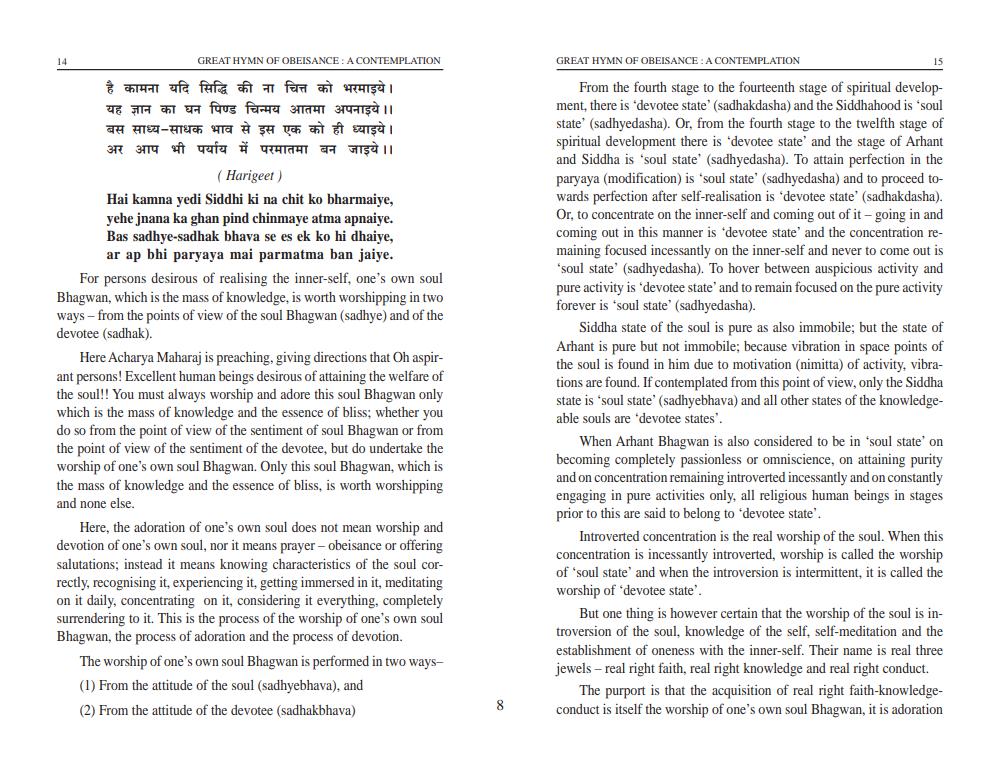Book Title: Namokar Mahamantra Ek Anushilan Author(s): Hukamchand Bharilla Publisher: Todarmal Granthamala Jaipur View full book textPage 9
________________ GREAT HYMN OF OBEISANCE: A CONTEMPLATION GREAT HYMN OF OBEISANCE: A CONTEMPLATION है कामना यदि सिद्धि की ना चित्त को भरमाइये। यह ज्ञान का घन पिण्ड चिन्मय आतमा अपनाइये ।। बस साध्य-साधक भाव से इस एक को ही ध्याइये। अर आप भी पर्याय में परमातमा बन जाइये ।। (Harigeet) Hai kamna yedi Siddhi ki na chit ko bharmaiye, yehe jnana ka ghan pind chinmaye atma apnaiye. Bas sadhye-sadhak bhava se es ek ko hi dhaiye, ar ap bhi paryaya mai parmatma ban jaiye. For persons desirous of realising the inner-self, one's own soul Bhagwan, which is the mass of knowledge, is worth worshipping in two ways - from the points of view of the soul Bhagwan (sadhye) and of the devotee (sadhak). Here Acharya Maharaj is preaching, giving directions that Oh aspirant persons! Excellent human beings desirous of attaining the welfare of the soul!! You must always worship and adore this soul Bhagwan only which is the mass of knowledge and the essence of bliss, whether you do so from the point of view of the sentiment of soul Bhagwan or from the point of view of the sentiment of the devotee, but do undertake the worship of one's own soul Bhagwan. Only this soul Bhagwan, which is the mass of knowledge and the essence of bliss, is worth worshipping and none else. Here, the adoration of one's own soul does not mean worship and devotion of one's own soul, nor it means prayer - obeisance or offering salutations; instead it means knowing characteristics of the soul correctly, recognising it, experiencing it, getting immersed in it, meditating on it daily, concentrating on it, considering it everything, completely surrendering to it. This is the process of the worship of one's own soul Bhagwan, the process of adoration and the process of devotion. The worship of one's own soul Bhagwan is performed in two ways(1) From the attitude of the soul (sadhyebhava), and (2) From the attitude of the devotee (sadhakbhava) From the fourth stage to the fourteenth stage of spiritual development, there is 'devotee state' (sadhakdasha) and the Siddhahood is 'soul state (sadhyedasha). Or, from the fourth stage to the twelfth stage of spiritual development there is 'devotee state and the stage of Arhant and Siddha is 'soul state (sadhyedasha). To attain perfection in the paryaya (modification) is 'soul state' (sadhyedasha) and to proceed towards perfection after self-realisation is 'devotee state' (sadhakdasha). Or, to concentrate on the inner-self and coming out of it-going in and coming out in this manner is 'devotee state and the concentration remaining focused incessantly on the inner-self and never to come out is 'soul state' (sadhyedasha). To hover between auspicious activity and pure activity is devotee state and to remain focused on the pure activity forever is 'soul state' (sadhyedasha). Siddha state of the soul is pure as also immobile; but the state of Arhant is pure but not immobile; because vibration in space points of the soul is found in him due to motivation (nimitta) of activity, vibrations are found. If contemplated from this point of view, only the Siddha state is 'soul state' (sadhyebhava) and all other states of the knowledgeable souls are devotee states'. When Arhant Bhagwan is also considered to be in 'soul state on becoming completely passionless or omniscience, on attaining purity and on concentration remaining introverted incessantly and on constantly engaging in pure activities only, all religious human beings in stages prior to this are said to belong to 'devotee state'. Introverted concentration is the real worship of the soul. When this concentration is incessantly introverted, worship is called the worship of 'soul state and when the introversion is intermittent, it is called the worship of devotee state'. But one thing is however certain that the worship of the soul is introversion of the soul, knowledge of the self, self-meditation and the establishment of oneness with the inner-self. Their name is real three jewels - real right faith, real right knowledge and real right conduct. The purport is that the acquisition of real right faith-knowledgeconduct is itself the worship of one's own soul Bhagwan, it is adorationPage Navigation
1 ... 7 8 9 10 11 12 13 14 15 16 17 18 19 20 21 22 23 24 25 26 27 28 29 30 31 32 33 34 35 36 37 38 39 40 41 42 43 44 45 46 47 48 49 50 51 52 53
